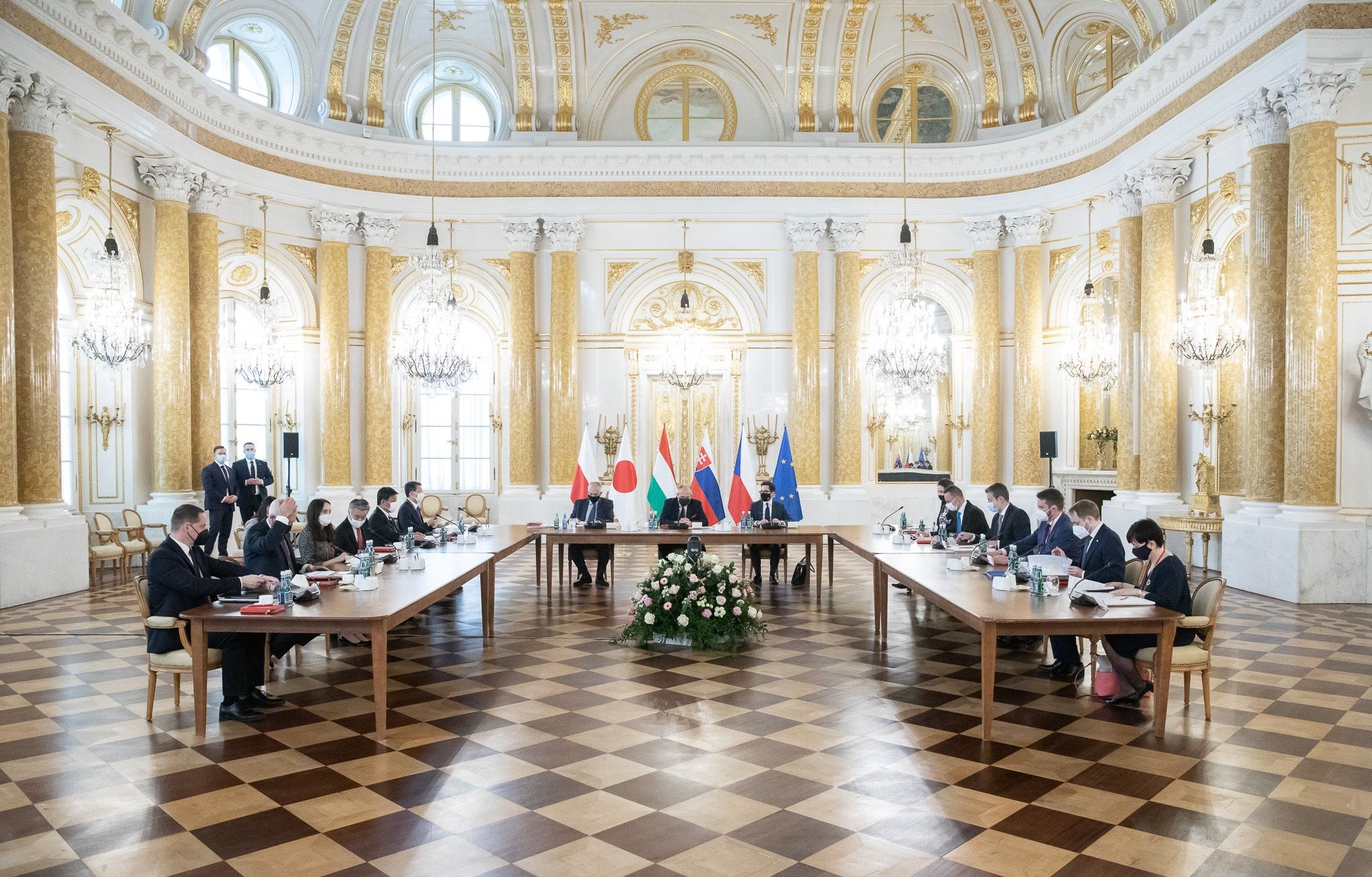Prospects for V4-Japan Cooperation

On 7 May, the heads of diplomacy of the V4 countries and Japan met in Warsaw. This was the 7th V4+Japan foreign ministers meeting. Apart from the prospects of cooperation in Central Europe, including in the Western Balkans, the talks focused on global issues, including security in Europe and the Indo-Pacific region, relations with the United States, and the EU-Japan partnership, including in the field of connectivity. In 2003, Japan became the first non-European country with which the group established cooperation in the “V4+” format.
Goals and Achievements
It was the Japanese side that initiated the format and which gives it the direction of cooperation even today. Its interest in the group came with the approaching membership of the V4 countries in the EU, with the first partnership agreement signed during their accession negotiations. Japan’s goal was to use the V4 as a practical tool to maintain relations with the four EU members with which it had had extensive economic ties since the 1990s, and thereby deepen cooperation with the Union. The format was also to be an instrument for exerting political influence in Central Europe and balancing China’s policy in the region.
The goal related to China gained importance in 2013 when, a year after China launched the “16+1” cooperation format with Central and Eastern European countries, Japan revived its political cooperation with the V4. The statement adopted at that time expanded the scope of the partnership to, among others, the coordination of activities in international organisations. The statement also emphasised that the V4 and Japan share a commitment to universal values, democracy, and international law. This contrasted with China’s regional cooperation, which lacked a normative dimension. The main goal of the V4 countries was, in turn, to further tighten relations with one of the largest economies in the world and to strengthen economic cooperation with Asian countries after the global financial crisis of 2008. An additional incentive was the high level of technological development in Japan and the prospect of knowledge transfer.
The V4 countries have become a stable economic partner for Japan, whose automotive and electronic industries have made investments there for decades, although not the largest amounts in Europe. According to OECD statistics, the value of Japanese foreign direct investment (FDI) stock in 2019 in Poland amounted to around $6 billion (2.6% of all FDI stock in Poland), in Czechia, around $4 billion (2%), and in Hungary, about $3 billion (3.4%), while in Slovakia, around $150 million (0.1%). This makes Japan first among Asian investors in Czechia, while in the other V4 countries South Korea is ahead of Japan (the presence of Chinese investments in all of them is less significant).
The deepening of economic relations has been accompanied by an intensified political commitment. In the last few years, the region was visited by former Prime Minister Abe Shinzo and foreign ministers Kono Taro and Motegi Toshimitsu, although their bilateral visits were only to Poland and Slovakia. Therefore, regular high-level meetings in the V4+Japan format serves to deepen the political dialogue with all the countries of the group. Among the results of this multilateral cooperation have been development projects implemented in Eastern Partnership countries and the Western Balkans, joint research on science and technology, and expert exchanges on economic affairs and cybersecurity.
Japan’s New View
The choice of topics at the recent high-level V4+Japan meetings indicate that Japan perceives the wider Central Europe as a region of high activity by the Chinese. As the importance for China of non-EU participants of the now “17+1” initiative (including Serbia and North Macedonia) grows, Japan also wants to extend its involvement to the Balkans. To this end, Japan wants to use the V4’s well-established contacts to implement joint projects that support the European integration of the Balkan countries. Such cooperation is in line with the EU’s goals in the Balkans, including the promotion of financially transparent infrastructure investments. The EU-Japan connectivity partnership signed in 2019, which mentions the Western Balkans and Eastern Europe among the target regions for cooperation, was presented by both sides as an offer based on values and the building of financially and environmentally sustainable, good-quality infrastructure. This was to be an alternative to the often-problematic Chinese investments under the Belt and Road Initiative, which sometimes even end in fiasco like in the case of the construction of a motorway in Montenegro. Japan would also consider cooperation in the field of connectivity under the Three Seas Initiative, which was raised during the May meeting by the Polish side.
V4-Japan relations have been given a new context by the institutionalisation of the EU-Japan partnership with the conclusion of Economic and Strategic Partnership Agreements in 2018. In the political sphere, they are an expression of a common attachment to the liberal international order—the rule of law, free trade, and freedom of navigation. Sharing these principles underpins the cooperation of both sides in the Indo-Pacific, a region of growing importance to their political and economic interests. Japan announced its strategy for this area in 2016, while the EU is now developing it. The Council of the EU adopted conclusions on this matter in April this year and tasked the European Commission with further work on it. Thus, Japan has taken up the Indo-Pacific theme among the V4 not only to promote its political project reflecting its general vision of international relations but also in hoping that the group’s members will contribute to shaping a vision of the EU’s actions in the region consistent with the assumptions of the Japanese strategy.
Conclusions and Perspectives
As in previous years, Japan has been reactive in its political actions in Central Europe. Its tightening of the political dialogue with the V4 is partly a response to China’s activity. It is in Japan’s interest to have a coherent EU policy towards China and the Indo-Pacific region, reflecting the Japanese view. For this reason, it is strengthening its presence in the Balkans and is seeking political support from the V4 countries, whose greatest value, from its point of view, lies in their membership in the EU. Their pro-integration attitude and the greatest possible influence on EU decision-making would be in favour of Japan. These factors will determine the intensity of political cooperation with the V4 in the future.
While the V4 countries compete with each other for investments, a coordinated political dialogue with Japan benefits all of them. It is in the interest of the group to accept the Japanese offer of cooperation and to strengthen relations in several dimensions—political, economic and security. Japan is not a “systemic rival” to the European Union, therefore cooperation with it does not result in internal EU disputes and cannot be used for political purposes to harm it. This creates favourable conditions for tightening economic relations with it, for example, in the field of green technologies, including the use of hydrogen. Japan, like the V4 countries, is facing the challenge of significantly reducing emissions. In addition, having the U.S. as a common ally opens up the possibility of strategic cooperation, including in the field of cybersecurity.
However, differences in attitudes in the EU towards China appear on many levels, which may be a challenge for V4-Japan cooperation. The Union’s attitude towards China is unclear. Evidence of that is the frozen ratification process of the bilateral investment agreement. The V4 is also divided in this respect: Hungary stands apart from the rest of the EU by its complete openness to political and economic cooperation with China and support for it by vetoing EU declarations critical of its partner. Such actions undermining EU unity limit the political dialogue between Japan and the V4.
Also, the V4 members’ excessive expectations regarding Japanese involvement in Central European connectivity projects may constitute another challenge. The EU-Japan partnership in this respect is aimed at countries outside the EU, primarily at infrastructure projects linking Europe and Asia. Therefore, it is unlikely that, apart from single investments, Japan will implement large-scale projects in the region.


